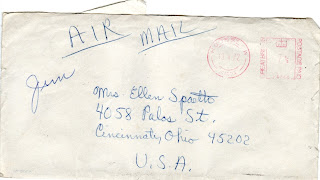 |
| Credit-Neil/Rob Melnychuk Getty Images |
When DCS (Director Customer Service) John McGlade made his departure announcement on TW841 as the 747 taxied from the gate at Rome's Flumicino Airport terminal, he anticipated a routine flight to New York. John was pleased to announce the flight's anticipated on-time arrival at JFK. The flight was full, with close to 200 passengers having connections to make at JFK. But this was no routine flight. Having recently attended a TWA reunion in Tucson, I got to relive John's tale of what happened next.
Shortly after takeoff from Rome, a troubled flight attendant located John in the front of the the aircraft, asking him to immediately follow her to the rearmost cabin in economy. Simultaneously, another flight attendant was paging for a doctor or nurse to ring their call bell. By the time John rushed to the scene, several nearby doctors and nurses were attending to the passenger, a grandfather, flying back home to the U.S. with his 13-year-old granddaughter.
The man appeared to have died instantly, likely from a massive heart attack. As there were no empty seats available to relocate the deceased, John had the flight attendant place a blanket over the grandfather's head and recline his seat, until John discussed the situation with the captain.
The captain, told John he would return to Rome, as they were only about 30 minutes airborne. Obvious to the captain, nine more hours of a full flight with a corpse on board was unthinkable. John thought otherwise. He told the captain that the man's family will have enough grief as it is, without having to go through a myriad of paperwork and additional agony to bring back the body from Italy. He also remarked that more than half of the passengers would miss their connection flights at JFK. Also, if they returned to Rome, Italian authorities may keep the plane at the gate for some required investigation after removing the body. This could cause the crew to become illegal to fly, thus requiring cancellation of the flight.
"So, where do you expect to put the body?" asked the captain.
"On the floor, behind the coach-lounge bar." answered John. "The coach lounge is closed to economy passengers on international flights due to IATA (International Air Transport Assn.) rules."
"Okay." nodded the captain. "We'll continue on to New York. Do what you've gotta do."
Luckily, John was one of only two DCS's hired with a background in TWA's maintenance department. In no time at all, he proceeded to the rearmost lavatory and removed the door. It was used as a stretcher for John and some volunteers to transport the blanket-covered corpse to the coach-lounge.
For the remainder of the flight, one of the lady passengers, a nurse, sat beside the grieving and shaken granddaughter. Showing typical TWA employee compassion and proactivity, a ground hostess at JFK voluntarily accompanied the granddaughter to her final destination on her connecting flight.
I personally applaud John for his handling of a delicate and sad situation with creativity and dignity. He was an excellent example of what the DCS program was all about.































